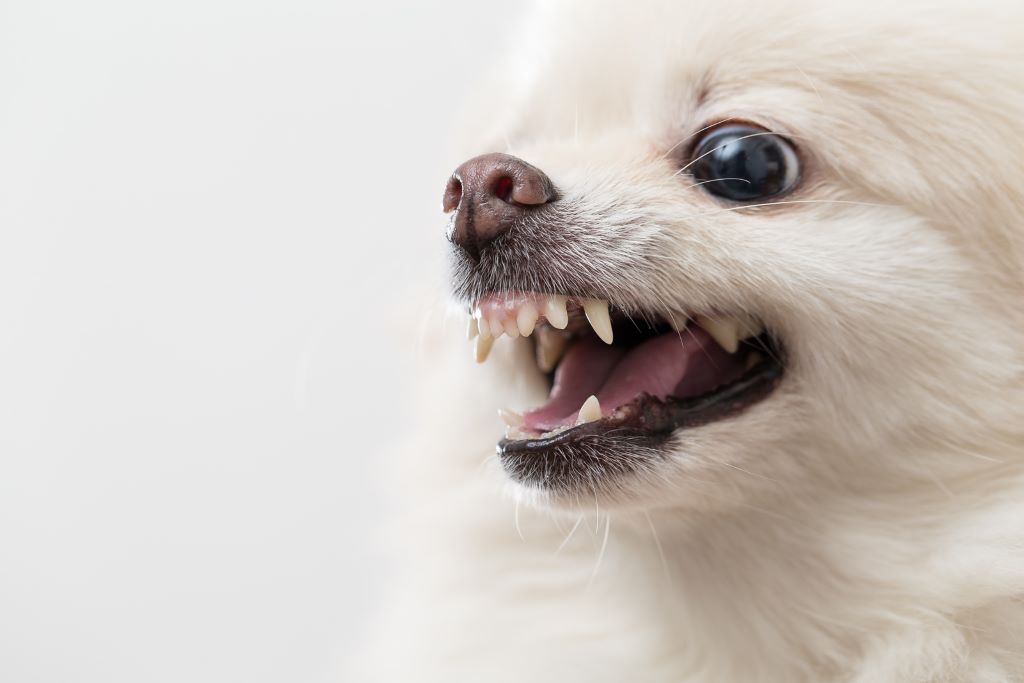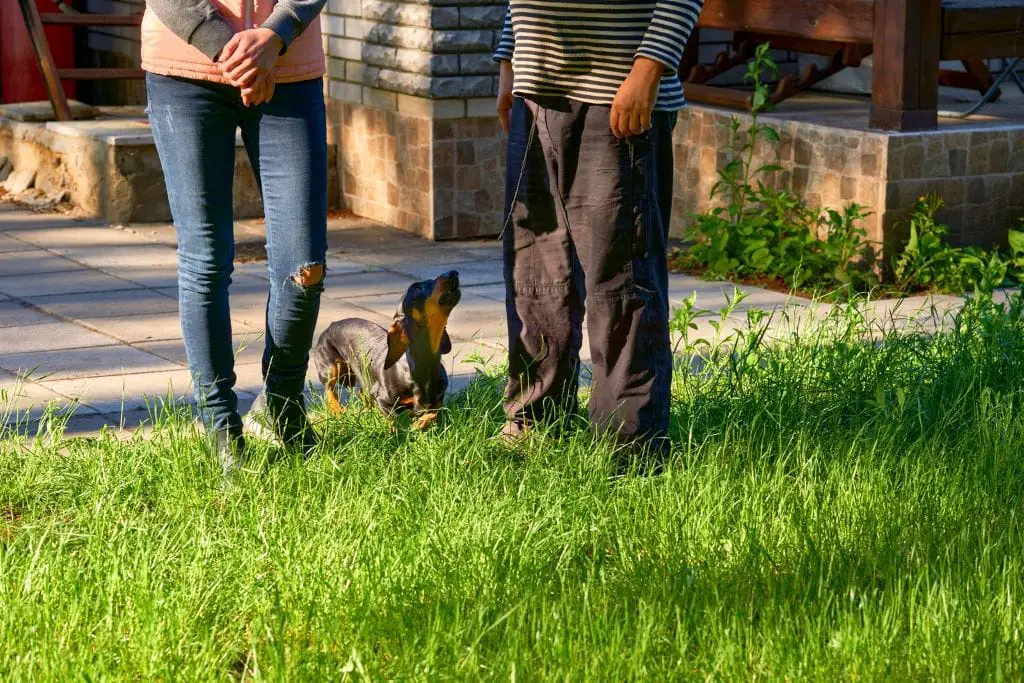Determined, daring, and devoted, dachshunds are a breed bursting with personality. But does their bold demeanor tip into aggression? You’re not alone in asking this. Many potential pet parents ponder, “Are dachshunds aggressive?”
This article aims to answer your questions, explore the breed’s history, and delve into their typical temperament traits. We’ll examine the factors influencing their behavior and the impact of training and socialization.
We’ll also look at potential signs of aggression, how to manage dominant attitudes, and their interactions with other pets and children. By the end, you’ll have the expert tips you need for a calm and happy home with your dachshund.
So, let’s resolve your concerns and help you understand if this breed’s feisty spirit is indeed a sign of aggression, or simply a manifestation of their vibrant vivacity.
Key Takeaways
- Dachshunds are not inherently aggressive, but their behavior can be influenced by upbringing, training, and environment.
- Proper training and socialization are crucial in shaping dachshund behavior and preventing aggression.
- Close supervision and careful management of interactions with other pets and children are necessary to ensure safety and happiness.
- Aggression in dachshunds is a sign of unhappiness, fear, or pain and not a reflection of being a bad dog.
Understanding the Breed’s History
Just like a history book teeming with tales, the past of the Dachshund breed isn’t just filled with hunting badgers; it’s got a hint of aggression too. The Dachshund breed, known for its unique and distinct physique, has a history that’s as robust as any of the common dog breeds. You might be surprised to learn that dachshunds were bred initially as hunting dogs. Yes, their long bodies and short legs made them incredibly efficient at burrowing into dens to flush out badgers and other small game.
This breed of dog was designed to be fierce, tenacious, and unyielding – characteristics that were highly desirable for hunting. But, it’s essential to understand that their aggression was directed towards their prey, not their human companions. Over time, however, as their roles shifted from hunters to household pets, some of this aggression has been misunderstood or mishandled.
So, does this mean all Dachshunds are aggressive? Not necessarily. While their history might suggest a certain level of aggression, it’s crucial to remember that every dog is an individual. Their behavior is heavily influenced by their upbringing, training, and environment, not just their genetic makeup.
Examining Typical Temperament Traits
So, you’re curious about the typical temperament traits of these pint-sized pups, aren’t you? Well, let’s dive into examining these traits, particularly focusing on dachshund aggression.
Firstly, dachshunds are known for their lively and courageous nature. This breed is infamous for its big personality packed into a small body. They’re charming and can be incredibly affectionate with their families. But when it comes to strangers or unknown pets, they can be quite wary and standoffish. This is where you might observe some aggressive behavior in dachshunds.
Dachshunds were originally bred for hunting, which might explain their feisty demeanor. They have a strong prey drive and can be quite stubborn at times. These traits can sometimes escalate to an aggressive dachshund if not properly trained and socialized from a young age. Remember, dachshunds’ aggressive behavior isn’t a given; it’s largely influenced by their upbringing and environment.
So, while these adorable sausage dogs can exhibit some signs of aggression, it’s crucial to remember that every dachshund is unique. With proper care, patience, and training, most dachshunds can be social, loving, and well-behaved pets.
Factors Influencing Behavior
Drawing a parallel to the nature versus nurture debate, a dachshund’s behavior isn’t purely dictated by its breed characteristics, but significantly shaped by various factors in its environment. It’s important to remember that dachshunds aren’t inherently aggressive. Instead, the reasons for aggressive behavior in dachshunds often stem from their upbringing, training, and socialization experiences.
Key factors that can lead to aggression in dachshunds include:
- Lack of socialization: Dachshunds that haven’t been properly socialized can develop fear-based aggression towards unfamiliar people and dogs.
- Poor training: Inconsistent or harsh training methods can lead to frustration, which may manifest as aggressive behavior.
- Health issues: Certain medical conditions, like pain or hormonal imbalances, can cause dachshunds to become aggressive.
Understanding the causes of aggression in dogs is crucial to addressing it. If your dachshund shows signs of aggressive behavior, it’s essential to address the issue promptly. Remember that aggressive behavior doesn’t mean your dachshund is a bad dog; rather, it’s a sign they’re unhappy, scared, or in pain. Address the root cause, whether it’s poor socialization, inappropriate training, or a health issue, to help your dachshund feel safe and secure.
Training and Socialization Impact

Understanding the impact of training and socialization on your pup’s behavior can make a world of difference in curbing unwanted actions. When it comes to dachshund behavior, early and consistent training is crucial. If you don’t train your dachshund properly, it may develop aggressive behaviour, stubbornness, or other undesirable traits.
Working with a professional dog trainer can be immensely helpful. They can provide you with the tools and techniques needed to train your dachshund effectively. This doesn’t only focus on teaching basic commands but also on socialization impact. Your dachshund needs to learn how to interact positively with other dogs and people. This is a significant step in preventing aggressive behavior.
Remember, it’s not just about discipline. You should also reward your pup for good behavior. Use treats, toys, or praise as incentives for your dachshund to behave well. Over time, these rewards can help reinforce positive behavior and reduce aggression.
So, don’t underestimate the power of proper training and socialization. They are key factors in shaping your dachshund’s behavior, and they can help your pup become a well-mannered and sociable member of your family.
Potential Signs of Aggression
As a loving pet owner, it’s crucial for you to keep an eye out for potential signs of hostility in your dachshund’s behavior. Recognizing the signs of aggression might not be as straightforward as you think, but by paying close attention, you can ensure your furry friend doesn’t turn into one of those dachshunds aggressive dogs you may have heard about.
Here are some potential signals to look out for:
- Growling or Snapping: If your dachshund is acting out of character and growling or snapping at you or others, it could be a sign of aggression.
- Change in Body Posture: An aggressive dachshund might make himself look bigger, raise his fur, or bare his teeth.
- Territorial Behavior: Some problems with aggression in dogs can be linked to protecting their territory, food, or toys.
- Avoidance or Fear: If your dachshund suddenly begins avoiding certain situations, people, or other animals, it might indicate an underlying issue with aggression.
Remember, aggression isn’t a trait that’s typical of every dachshund. Each pooch is unique with its own personality and temperament. If you notice any of these signs, don’t panic. Reach out to a professional who can provide guidance and help manage any potential aggression in your beloved pet.
Managing Dominant Attitudes
Taming your wiener dog’s bossy streak could be likened to a dance, a delicate waltz that’s all about balance, patience, and clear communication. It’s not uncommon for a dachshund to show signs of aggression towards strangers or other dogs. But, with the right approach, you can stop your dachshund’s aggression effectively.
In managing your dachshund’s dominant attitudes, it’s crucial to understand their triggers. Here is a simple table that might help:
| Trigger | Observed Behaviour | Recommended Solution |
|---|---|---|
| Fear | Lashing out | Introduce new things slowly and gently |
| Territory | Growling | Establish and maintain clear boundaries |
| Dominance | Biting | Implement firm and consistent training |
| Frustration | Barking | Provide ample mental stimulation and exercise |
| Pain | Snapping | Ensure regular veterinary check-ups |
Each row represents a possible trigger for your dachshund’s aggressive behavior, the corresponding behavior, and a potential solution. Remember, every dachshund is unique, and what works for one might not work for another.
You are the best judge of your dachshund’s temperament and only you can make the dance of discipline enjoyable for them. So, stay patient, keep practicing, and remember: your consistent efforts will help create a balanced and happy relationship with your Dachshund.
Interactions with Other Pets and Children
Navigating your wiener dog’s interactions with other pets and children can be quite a dance in itself, requiring you to be the choreographer who ensures everyone’s safety and happiness. Dachshunds may be aggressive towards other dogs or pets, especially if they feel threatened or if their territory is being invaded. This is part of their natural instinct as a breed initially bred for hunting, thus exhibiting an assertive and protective demeanor.
Your dachshund’s aggression towards dogs or other pets may manifest in various ways, such as growling, snapping, or even biting. It’s crucial to remember that this doesn’t mean your dachshund is a bad dog or an aggressive breed by nature. It’s simply how they express discomfort or fear.
When it comes to interactions with other pets and children, it’s important to supervise them closely. Children, in particular, may not understand the signs of a dog feeling threatened and may inadvertently provoke a defensive response. Teach your children how to approach and interact with your dachshund respectfully.
Remember, your dachshund’s behavior is largely dependent on your guidance and influence. Be patient, provide positive reinforcement, and seek professional help if needed. You can cultivate a peaceful and loving environment for everyone in your home.
Expert Tips for a Calm and Happy Home
You might be surprised to learn that research shows nearly 70% of behavioral issues in dogs, including aggressive dog breeds like dachshunds, can be managed or resolved through consistent training and positive reinforcement methods. As a dachshund owner, it’s crucial to be patient, persistent, and positive in your approach.
Here are some expert tips for a calm and happy home:
| Recommended Actions (Do’s) | Actions to Avoid (Don’ts) |
|---|---|
| Utilize positive reinforcement techniques | Avoid yelling or hitting your dog |
| Maintain consistency with commands | Do not allow undesirable behavior to persist |
| Encourage your dog’s socialization with others | Avoid isolating your dog from social interactions |
| Ensure a safe, loving, and nurturing environment | Never neglect your dog’s physical and emotional needs |
These tips can help stop dachshund aggression and promote a more harmonious living environment. Remember, your goal is to train your dog to respond positively to you and your commands.
Remember, every dog, including dachshunds, has a unique personality. Some may be more challenging to train than others. But with dedication, patience, and the right techniques, you can manage and even eliminate aggressive behaviors. This effort will make your home a happier place for both you and your pet.
Frequently Asked Questions
What health issues are common in dachshunds that might affect their temperament?
Dachshunds can develop health issues like intervertebral disc disease (IVDD) and epilepsy. These conditions could possibly affect their temperament, making them irritable or anxious. Regular vet check-ups help in managing these issues effectively.
How do dachshunds respond to strangers compared to their owners?
You might wonder how a dachshund behaves around strangers versus their owners. Interestingly, these little dogs often show more affection towards their owners, while they might be a bit hesitant or guarded with strangers.
Are there differences in behavior between male and female dachshunds?
Yes, there can be differences in behavior between male and female dachshunds. Typically, males may be more territorial, and females can be more independent. However, individual personality and upbringing greatly affect their behavior.
How long does it typically take to train a dachshund to be less aggressive?
Imagine having a feisty little dachshund, yapping at every stranger. Training them to be less aggressive can take a few weeks to several months, depending on their temperament and your consistency with the training.
What type of diet should a dachshund have to ensure optimal behavior?
Your Dachshund should have a well-balanced diet, rich in high-quality proteins, whole grains, fruits, and vegetables. Avoid foods with additives and fillers, as they can affect behavior. Regular meals can promote stable energy levels and mood.
Conclusion
So, are dachshunds aggressive? Not necessarily. It’s more about their upbringing and socialization. You’ve seen how their history, temperament, and environment can influence their behavior.
They may show signs of dominance, but with proper training, they can become well-adjusted pets. Remember, it’s about understanding their needs and responding appropriately. So, go on, embrace your role as a dachshund parent, and enjoy a calm, happy home with your loving, albeit occasionally feisty, friend.









